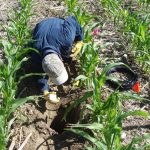Kansas leads most of the nation when it comes to agriculture, and it’s a tradition that has existed since before the Sunflower State joined the Union. Over the course of time, much about farming has changed in each of Kansas’ 105 counties – from crop rotations to farm equipment to irrigation technologies. Dr. Jonathan Aguilar is one of the researchers from Kansas State University helping farmers use the latest innovations to improve their harvest.

Dr. Aguilar hails from the Philippines, where he received both his bachelor’s and master’s degrees in agricultural engineering from the University of the Philippines-Los Baños (UPLB). While there, his studies focused on land and water resources as it pertained to irrigated agriculture and environmental stewardship. After graduating, he continued to work at the university as a researcher, as well as taking on several water resource-related projects with the UPLB Foundation, the Philippine Department of Agriculture, and the UN Food and Agriculture Organization. Dr. Aguilar came to K-State to pursue his doctoral degree in biological and agricultural engineering and graduated in 2009. He joined the faculty here in 2012.
Continue reading “K-State researcher produces new innovations for Kansas farmers”

